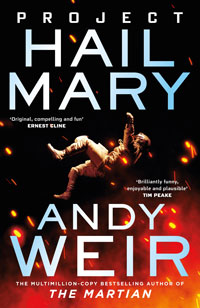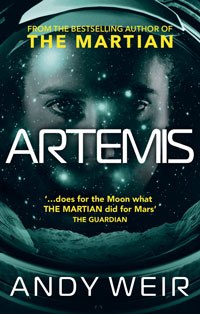(Sep 14 – Oct 18)
After spending more than two months wading through IT I decided it was time to take a short break from Stephen King. I’d actually decided right from the start that I would take a break after IT, but it makes it sound more dramatic if I paint things as though reading ITwas a glorious struggle that left me desperate for some literary recuperation. In either case, ITrepresents something of a transition point in the Stephen King bibliography (of which more in my next post) so it seemed a good moment at which to take a Kingterval. Yes, that pun is terrible and, yes, I am also very proud of it.
The Martian was one of my favourite books of [insert year that The Martian came out]. It was one of those rare and beautiful novels that I just couldn’t put down. I missed out on Weir’s second novel, Artemis, due to mixed reviews and general inertia, but when I started reading good things about his latest, Project Hail Mary, I decided I definitely wanted to check it out. And, since it made for a tidily themed trio, I decided why not read all three of Weir’s novels before getting my King happening again.
Project Hail Mary

I acquired a very large paperback copy of this, which sat on my desk for a week or two before I finally finished IT. I don’t want to talk too much about the plot because there are some nice little twists here and there, but I can see why reviewers were comparing it to The Martian: it uses the same basic premise of sticking a person alone in a perilous situation who needs to science the shit out of his various predicaments.
This was a very easy and engaging read, and I highly recommend it. However, the writing did feel a bit thin in comparison to The Martian. It’s not a spoiler to reveal that our main character wakes up with amnesia—it gives us an easy engine to hook the narrative on, but it also means we can’t really get into the main character’s head to the same degree that we do with The Martian. However, because of this device, one of the things I did enjoy about this novel is how much it felt like playing a video game: you wake up not knowing anything, gradually you explore and expand your environment, learning the rules as you go. The longer you spend in this universe, the bigger it becomes. Literally. That said, I suspect that the slightly more fanciful plot is another reason why this one doesn’t feel as real as The Martian.
It’s perhaps not fair to keep comparing this to The Martian—it’s a great read regardless of whether you’ve read that earlier novel—but it has to be said that consciously trying to echo a successful formula will inevitably drive comparisons.
The Martian

I read The Martian second, because sometimes I just have to do things out of order. And also because I didn’t have a copy of Artemis yet. This was my third read of The Martian and I was keen to see how a book I had enjoyed hugely on previous occasions added up. The good news is it still holds up (but you didn’t really need me to tell you that).
Despite reading it twice, and having seen the movie a couple of times, I’d completely forgotten that there was a dual narrative going on: the predicament on Mars, and the efforts back on Earth to get their man home. One of the other major drivers of the book is the main character’s optimism and sense of humour; I’m sure this was a huge contributor to the novel’s success. This, unfortunately, is where Project Hail Mary suffers—it could almost be the same character in both novels (barring a few spoilerific characteristics that I won’t divulge here).
Artemis

I was a little wary of this one due to the mixed reviews. The thing that sold me was reading it described as “as heist movie set on the moon”. It’s not really that, it’s more a of pulp crime novel set on the moon, but it’s still a fun melding of genres. I went in hoping not to be disappointed and ended up having a really good time with it. The general set up is pretty different to Weir’s other two novels, but this is the one where Weir’s real strengths as a novelist become clear.
You see, Weir follows one of the first rules of crafting a compelling narrative, and he does it really well: he throws problems at his characters and he does it constantly. No sooner have they resolved one crisis than another one appears over the horizon. And the other thing Weir does, which is more or less his Unique Selling Point, is that his characters always solve their problems with science. As such you get entertaining high-stakes drama and science lessons in one easy to read package.
I can’t guarantee that you’ll enjoy Artemis if you enjoyed The Martian, but it’s got a lot of the same elements: a funny, resourceful main character and plenty of twists and turns that bring fresh peril. It’s also a different read: our lead character is female, and has an engagingly cynical streak; also the premise revolves rather less around people being heroes, and more around people trying to make a few bucks, or simply to survive.
This one probably doesn’t deserve to get lost under the shadow of The Martian.
The Adaptations
At this point there’s only one adaptation of Andy Weir’s novels: the 2015 movie of The Martian. There is talk of Ryan Gosling producing and starring in a movie of Project Hail Mary (and, I tell you, I would love to see this one visualised) and some presumably stalled attempts to do something with Artemis (an HBO type series would do the job very nicely here I reckon). But let’s talk about Ridley Scott’s version of The Martian.
First and foremost, it’s a very good film. It’s a classic sci-fi drama that sits very nicely alongside the sort of hard science fiction films they used to do before Star Wars came along. But it also loses a fair bit of the novel’s charm. Matt Damon carries the movie faultlessly, but he’s not the character we grew to love from the novel. Ridley Scott, not a director known for delivering the funnies, really scales down the humour which is a shame because, with a script written by Drew Goddard, this should shine with wit.
Outside of those minor criticisms, the film is remarkably faithful to the novel which probably goes to show how tightly crafted the narrative was in the first place. If it ain’t broke, well … Weir will probably break it anyway just to find a fun way of fixing it again.
The Reading
All told it took me about a month to read these three novels, which is pretty good going for me. Two of those weeks were spent with Project Hail Mary, which was a consistently enjoyable read. I then started gangbusters on The Martian and then slowed down, probably because I pretty much knew what was going to happen. As such it worked out quite well that I left Artemis to last, since it gave me something fresh to read before getting back into my King reread.
As I said above, these are very easy books to read—and that’s not meant to be an insult, they’re simply very engaging and Weir does an excellent job of keeping things moving along while doing his science thing along the way.
Up next: time to meet King’s number one fan …
